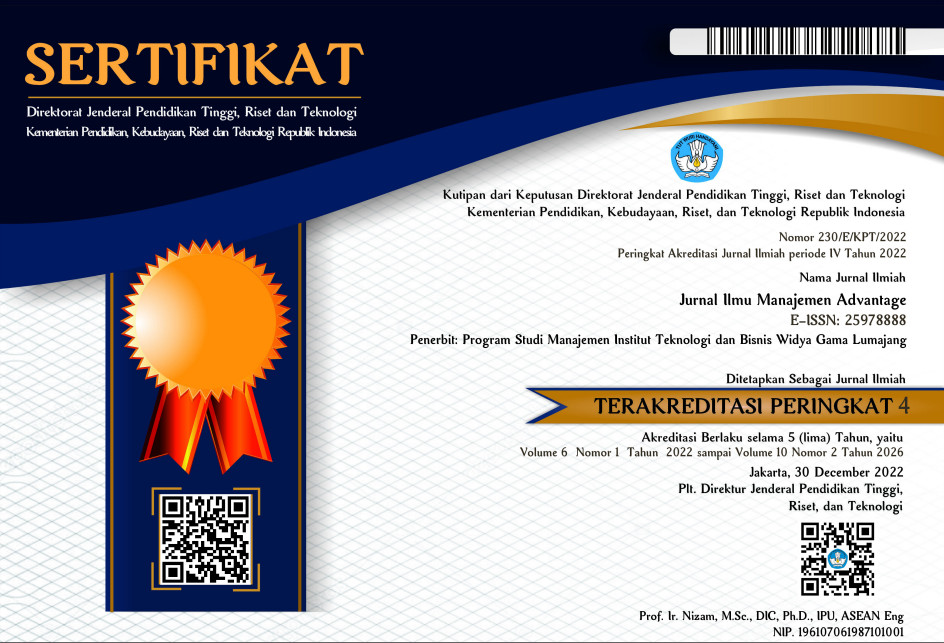Motivation of Woman Shopping in Traditional Market in Surabaya City
DOI:
https://doi.org/10.30741/adv.v4i2.638Keywords:
shopping behavior, motivations, traditional marketAbstract
This research is about the shopping behavior of woman in traditional market. The result of the study that there are motivations shopping in traditional market in Surabaya. This research uses qualitative approach. This sample of study was 20 people, with the criteria ten women were working woman and ten others were housewives by using snowball sampling technique. There are 12 themes emerge in this study namely shopping motivations are Many sellers, Cheaper price, Many choices, Good quality products, The price can be negotiable, More Economized, If consumer want the need in high quantity, If there aren’t goods in vegetable mobile seller either in modern market, If consumer has no time to buy the need in mobile vegetable seller, completeness, the product can be sold in small quantity, If the vegetable mobile sellers do not sell. The most motivated motivation by consumers shopping in traditional market is they can get cheaper price The government should make a fair regulation among traditional market and modern retail.
Downloads
References
Anang, C. K. (2017). Visi dan Misi serta Upaya Strategis untuk Perbaikan PD Pasar Surya. Makalah Visi dan Misi serta Upaya Strategis. Direktur Utama
D’Haese. M., Van den Berg, M. and Speelman. S, (2008) A Country wide Study of Consumer Choice for an Emerging Supermarket Sector: A Case Study of Nicaragua, Development Policy Review, 26(5).603-615.
Dries, L., Reardon, T and Swinnen, J.F.M. (2004) The Rapid Rise of Supermarkets in Central and Eastern Europe: implication for the agrifood sector and rural development, Development Policy Review, 22(5).525-556.
Pramudiana, D. I. (2017). Perubahan Prilaku Konsumtif Masyarakat Dari Pasar Tradisional ke Pasar Modern. Asketik. Vol 1 No 1. 35-43
Goldman, A., Krider, R. and Ramaswami, S. (1999) The Persistent Competitive Advantage of Traditional Food Retailers in Asia: Wet Markets Continued Dominance in Hongkong, Journal of Macro marketing, 19(2), 126-139
Gordon, M., Sauer, J. and Supatpongkul, P. (2011) Wet Markets, Supermarkets, and the Big Middle for food retailing Retailing in Developing Countries: Evidence from Thailand, World Development, 39(9), 1624-1637.
Hagen, J. M. (2002). Causes and consequences of food retailing innovation in developing countries; Supermarket in Vietnam, New York USA, Cornell University, Department of Applied Economics and Management
Ho, S. C. (2005). Evolution versus tradition in marketing system : The Hongkong food retailing experience, Journal of Public Policy and Marketing, 24(1),90-99
Irene and Kiupssy. (2002). The Rapid Rise of Supermarket in Costa Rica: Impact on Horticultural Markets, Development Policy Review, 20(4),473-485
Oberg H, Bell A. (2012). Exploring phenomenology for researching lived experience in Technology Enhanced Learning. in Hodgson V. Jones C. de Laat M. Mc Connell. Ryberg, T. & Sloep P. (Eds) The Eight International Conference on Networked Learning 2012. 2-4 April. Maastricht School of Management. Maastricht. The Netherland. 203-210.
Omar, O. (1999). Retail Marketing. illustrated edn. Financial Times Management, Pitman.
Reardon, T. and Berdegue, J.A. (2002). The Rapid Rise of Supermarkets in Latin America: Challenges and Opportunities for Development. Development Policy Review.20(4). 371-388
Reardon, T., Henson, S. and Berdegue, J.A. (2007). Proactive fast tracking diffusion of supermarkets in developing countries: implications for market institutions and trade, Journal of Economic Geography 7(4). 399-431
Reardon, T. and Berdegue, J.A. (2008) The Retail led transformation of agrifood systems and its implications for development policies. Background paper prepared for the World Development Report
Samiee, S. (1993). Retailing and Channel Consideration in Developing Countries: A review and research propositions, Journal of Business Research, 27(2), 103-129
Tauber, E. M. (1972). “Why Do People Shop?”, The Journal of Marketing, 36(4). 46-49.
Downloads
Published
How to Cite
Issue
Section
License
Copyright (c) 2020 Rena Febrita Sarie

This work is licensed under a Creative Commons Attribution-NonCommercial 4.0 International License.










